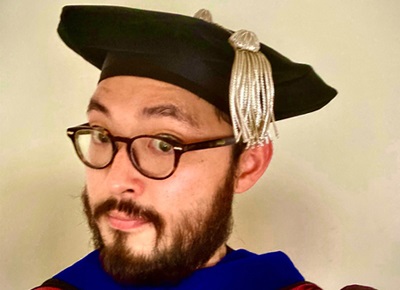
Yusaku Yajima(2010年度卒業)
I obtained my bachelor’s degree in English at Dokkyo University in 2011, where I studied Intercultural Communication, among others, under the supervision of Dr. Kazuhiro Kudo. At Dokkyo, I became involved in various programs and organizations (e.g., English speaking society, or ESS). I took Dr. Kudo’s courses and seminar, which I believe is in part why I have become who I am today. Dr. Kudo, always generating open and vulnerable dialogue, taught me a lot about what it means to live in an ever-globalizing society, to communicate in culturally sensitive and productive ways, and to meaningfully understand and complicate the dialectical tensions where we are situated in relation to one another under socially constructed categories of difference. These experiences have become the fundamental part of me.Dr. Kudo has encouraged and supported me ever since I told him that I would want to pursue a career as a scholar in the U.S.A. So, I followed it. Soon after graduating from Dokkyo University, I moved to Minnesota to pursue a master’s degree and then to Illinois to obtain my Ph.D.—both in Communication Studies with emphases on Intercultural Communication and Critical Pedagogy. While I was a graduate student, I was also an instructor in the U.S.A. and a visiting scholar in Finland. I taught a variety of courses including public speaking, introduction to communication studies, culture and communication.
Currently, I am a full-time university professor in the U.S.A who researches and teaches Intercultural Communication and Critical Pedagogy. I have published four academic books. I chose a university professor as my career because I wanted to pursue something that is both tangible and abstract, challenging and joyful, and serves various communities locally and globally. Being a professor has been a wonderful option for me, because I see it as an art of ambiguous possibility as well as an urgent communal act—given our current state of anti-intellectualism and technology-centric thinking.
It has been interesting to research and teach communication because of its interdisciplinary nature and emphasis on meaning-making, which allows me to analyze the nuanced ways in which various kinds of institutions impose obstructions on our becoming, thinking, and speaking. I like how I can approach broad phenomena from different angles—for example, critically, qualitatively, and quantitatively. It is my pleasure to teach my students what I have learned at Dokkyo university and at other institutions of higher education I have attended abroad. It is so special to see my students become competent individuals, working/living locally and globally, and making a difference in a lot of people’s lives no matter what path they choose. I see my students’ voluntary and vulnerable class participation as a gift. I hope my research and teaching make it matter.
